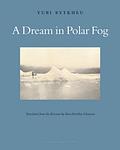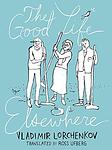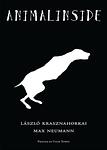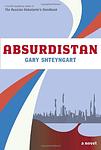The Greatest Hungarian, Russian "Fiction" Books Since 1990
Click to learn how this list is calculated.
This list represents a comprehensive and trusted collection of the greatest books. Developed through a specialized algorithm, it brings together 288 'best of' book lists to form a definitive guide to the world's most acclaimed books. For those interested in how these books are chosen, additional details can be found on the rankings page.
Genres
Countries
Date Range
Reading Statistics
Click the button below to see how many of these books you've read!
Download
If you're interested in downloading this list as a CSV file for use in a spreadsheet application, you can easily do so by clicking the button below. Please note that to ensure a manageable file size and faster download, the CSV will include details for only the first 500 books.
Download-
1. The Clay Machine-gun by Victor Pelevin
"The Clay Machine-gun" is a surreal and complex novel that explores the nature of reality and illusion. The story is set in post-Soviet Russia and follows a protagonist who has multiple identities, including a poet in 19th-century Russia, a 20th-century psychiatric patient, and a 21st-century advertising executive. The narrative moves between these identities and realities, blurring the lines between them and creating a layered and philosophical exploration of Russian society, identity, and the human psyche.
-
2. Celestial Harmonies by Peter Esterhazy
"Celestial Harmonies" is a historical novel that tells the story of the aristocratic Esterházy family, tracing their lineage from the late Middle Ages to the present day. The narrative is divided into two parts, with the first part featuring a series of vignettes about the family's ancestors, while the second part focuses on the experiences of the narrator's father under the Communist regime in Hungary. The novel is characterized by its intricate structure, complex themes, and lush, poetic language, offering a rich exploration of Hungarian history, family dynamics, and the human condition.
-
3. Happy Moscow by Andrey Platonov
"Happy Moscow" is a satirical novel set in the Soviet Union during the height of Stalinist rule, following the life of a young woman, Moscow Chestnova, who is named after the capital city. Despite the harsh realities of life under an authoritarian regime, she maintains a positive and optimistic outlook, symbolizing the Soviet Union's propaganda that promoted an image of a happy and prosperous society. The novel, through its characters and their experiences, explores the paradoxes and contradictions of the Soviet society, challenging the official narrative of happiness and prosperity.
-
4. Soul and Other Stories by Andrey Platonov
"Soul and Other Stories" is a collection of short stories that delve into the human condition and the struggle for identity in a world filled with political and social upheaval. The stories are set in a variety of contexts, from the harsh landscapes of Central Asia to the chaos of the Russian Revolution. The characters are often faced with existential crises, grappling with questions of purpose, meaning, and morality. The narrative is marked by a unique blend of philosophical inquiry, poetic prose, and a deep sense of empathy for the human plight.
-
5. Child 44 by Tom Rob Smith
In a 1950s Soviet Union gripped by fear and paranoia, Leo Demidov, a dedicated officer of the state security agency, is faced with a chilling reality: a series of brutal child murders that the government refuses to acknowledge. As Leo defies his superiors and embarks on a dangerous investigation, he becomes entangled in a web of political intrigue and personal danger, risking everything to uncover the truth and protect those he loves. "Child 44" is a gripping thriller that explores the dark underbelly of a repressive regime and the resilience of one man determined to bring justice to a society plagued by secrets.
-
6. The Life of Insects by Victor Pelevin
"The Life of Insects" is a surreal novel that explores the complexities of post-Soviet Russia through the lens of a bizarre seaside community of humans who transform into various types of insects. The narrative unfolds through a series of interconnected stories that delve into the characters' struggles, dreams, and fears, serving as a metaphor for the human condition. The book provides a satirical commentary on society's ills, touching on themes of capitalism, corruption, and the search for identity in a rapidly changing world.
-
7. Medea And Her Children by Lyudmila Ulitskaya
"Medea And Her Children" by Lyudmila Ulitskaya is a powerful and emotionally charged novel that delves into the complex relationships between a mother and her children. Set in Soviet Russia, the story follows the lives of three generations of women as they navigate the challenges of love, sacrifice, and the oppressive political climate. Through vivid and compelling storytelling, Ulitskaya explores the universal themes of family, loyalty, and the enduring strength of a mother's love.
-
8. The Time: Night by Ludmila Petrushevskaya
The book is a stark portrayal of the struggles faced by a multi-generational family living in the cramped quarters of a Moscow apartment during the twilight years of the Soviet Union. The narrative is driven by the matriarch, a poet who is both resilient and weary, as she navigates the complexities of caring for her mentally unstable daughter and her neglected grandson. The story delves deep into themes of maternal sacrifice, poverty, and the relentless passage of time, painting a grim picture of domestic life and the burdens of womanhood in a society that is as unforgiving as it is oppressive.
-
9. Hurramabad by Andrei Volos
"Hurramabad" is a gripping and thought-provoking novel set in contemporary Russia. The story follows the lives of three young men who find themselves entangled in a web of corruption, violence, and political intrigue in the city of Hurramabad. As they navigate through the complexities of power and loyalty, the characters are forced to confront their own moral dilemmas and make difficult choices that will shape their futures. With its vivid portrayal of a corrupt society and its exploration of themes such as friendship, love, and the pursuit of justice, "Hurramabad" offers a compelling and immersive reading experience.
-
10. You Cried Bitterly In Your Sleep by Yuri Kazakov
The book is a collection of short stories that delve into the complexities of human emotions and relationships, set against the backdrop of Soviet Russia. Through a series of poignant narratives, the author explores themes of love, loss, and the struggle for personal identity amidst societal expectations. The characters in these stories confront their deepest fears and desires, often finding themselves in situations that challenge their moral compass and force them to reckon with the harsh realities of their lives. The title story, in particular, captures the essence of the collection, depicting a moment of vulnerability and the profound impact of dreams on one's waking life.
-
11. Jadviga Párnája by Pál Závada
"Jadviga Párnája" is a historical novel set in a Hungarian village at the turn of the 20th century. It delves into the life of a young woman named Jadviga, who is of Polish descent, and her marriage to a Hungarian man, András. The narrative unfolds through a series of letters, diary entries, and other documents, painting a vivid picture of rural life, social norms, and the personal struggles of the characters. The novel explores themes of love, fidelity, identity, and the complexities of human relationships against the backdrop of a society grappling with change and the influences of modernity.
-
12. A Dream In Polar Fog by Yuri Rytkheu
"A Dream In Polar Fog" is a captivating and poignant tale that follows the journey of John MacLennan, a Scottish whaler who becomes stranded in the Arctic. As he navigates the harsh and unforgiving landscape, MacLennan encounters the indigenous Chukchi people and forms a deep bond with a young Chukchi boy named Khariton. Through their shared experiences and cultural exchange, the novel explores themes of identity, survival, and the power of human connection amidst the backdrop of the Arctic wilderness.
-
13. The Book Of Fathers by Miklós Vámos
"The Book of Fathers" chronicles the lives of twelve generations of men from a Hungarian family, spanning over 300 years from the 18th century to the modern day. Each chapter focuses on one descendant, capturing the historical and personal challenges they face, from the rise and fall of empires to the intimate struggles of love and loss. The novel weaves a tapestry of Hungarian history and the family's legacy, marked by a mystical diary that is passed down from father to son, which possesses the power to influence the fate of its keeper. Through the generations, the book becomes a symbol of the family's heritage and the enduring connection between the past and the future.
-
14. The Good Life Elsewhere by Vladimir Lorchenkov
"The Good Life Elsewhere" is a darkly humorous and satirical novel that follows a group of Moldovan villagers who embark on a chaotic journey to Italy in search of a better life. Through their misadventures, the author exposes the harsh realities of poverty, corruption, and the desperate measures people are willing to take in pursuit of a brighter future. With a blend of absurdity and poignant social commentary, the novel offers a compelling exploration of the human condition and the universal desire for a better life.
-
15. There Once Lived A Woman Who Tried To Kill Her Neighbour’s Baby by Ludmila Petrushevskaya
In this collection of dark and haunting tales set in Soviet Russia, Ludmila Petrushevskaya explores the depths of human desperation and the complexities of human relationships. Through her vivid and evocative storytelling, she delves into the lives of ordinary individuals who are trapped in a web of loneliness, despair, and unfulfilled desires. With a blend of realism and the supernatural, Petrushevskaya crafts a mesmerizing narrative that exposes the raw emotions and hidden secrets that lie within the human heart.
-
16. Klotsvog by Margarita Khemlin
"Klotsvog" is a poignant and introspective novel that follows the life of Maya Abramovna Klotsvog, a Jewish woman living in Soviet Russia during the 20th century. Through Maya's perspective, the book explores themes of identity, love, and the struggles faced by Jews in a society plagued by anti-Semitism. With a blend of humor and tragedy, the story delves into Maya's personal relationships, her experiences as a mother and wife, and her resilience in the face of adversity. Ultimately, "Klotsvog" is a profound exploration of one woman's journey through life and her unwavering spirit in the midst of societal challenges.
-
17. The Sacred Book Of The Werewolf by Victor Pelevin
This novel introduces readers to a captivating world where ancient myth meets modern life through the eyes of a two-thousand-year-old werefox named A Hu-Li. Disguised as a teenage girl, she navigates contemporary Russia, using her supernatural abilities and seductive powers to survive in a society dominated by men. Her life takes a dramatic turn when she falls in love with a werewolf, a figure representing the novel's exploration of themes such as identity, transformation, and the search for spiritual enlightenment. Set against the backdrop of post-Soviet Russia, the narrative delves into philosophical discussions, blending Eastern philosophies with the complexities of modern existence, all while maintaining a sharp sense of humor and a deep sense of mysticism.
-
18. Animalinside by László Krasznahorkai, Max Neumann
"Animalinside" is a haunting and surreal novella that delves into the mind of a narrator who becomes consumed by an animalistic alter ego. As the protagonist's thoughts and actions blur the line between human and animal, the narrative takes on a dark and disorienting tone, exploring themes of identity, violence, and the primal instincts that lie within us all. Through the collaboration of Krasznahorkai's mesmerizing prose and Neumann's striking illustrations, "Animalinside" offers a mesmerizing and thought-provoking exploration of the human psyche.
-
19. Absurdistan by Gary Shteyngart
"Absurdistan" is a satirical novel by Gary Shteyngart that follows the story of Misha Vainberg, a wealthy and overweight Russian-American who finds himself stuck in the fictional country of Absurdistan after his father's death. The country is on the brink of a civil war, and Misha must navigate his way through the corrupt and absurd political landscape to get back to America and reunite with his love interest. Along the way, he encounters a cast of eccentric characters and experiences the absurdity of life in a country where everything seems to be falling apart.
-
20. Gergő és Az álomfogók by Gyula Böszörményi
In this enchanting tale, a young boy named Gergő discovers a mysterious world of dream catchers who are responsible for protecting dreams from the nightmares that seek to disrupt them. As Gergő embarks on a thrilling adventure, he learns about the delicate balance between the dream world and reality, and the importance of confronting one's fears. With the help of new friends and his own courage, Gergő must navigate through this fantastical realm to ensure that the harmony of dreams is preserved for himself and others. Along the way, he gains insights into bravery, friendship, and the power of imagination.
-
21. The Mountain And The Wall by Alisa Ganieva
"The Mountain and the Wall" is a thought-provoking novel set in a fictional region of Russia, where a massive wall is being constructed to separate the Muslim population from the rest of the country. Through the eyes of various characters, the book explores the impact of this division on individuals and communities, delving into themes of identity, religion, and the struggle for freedom. As tensions rise and conflicts erupt, the story highlights the complexities of human relationships in a divided society.
-
22. Zuleikha by Guzel Yakhina
"Zuleikha" is a captivating historical novel set in 1930s Soviet Union, following the life of Zuleikha, a Tatar woman who is forcefully taken from her home and exiled to Siberia. As she struggles to adapt to the harsh conditions of the remote village, Zuleikha finds solace in her resilience and the unexpected connections she forms with her fellow exiles. Through her journey of survival, love, and self-discovery, Zuleikha's story beautifully explores themes of identity, freedom, and the indomitable human spirit.
-
23. The Stories of Vladimir Nabokov by Vladimir Nabokov
This collection showcases the unique storytelling abilities of a renowned author, exploring a variety of themes and settings through 65 different tales. The stories range from brief, whimsical observations and elaborate fantasies to deeply emotional narratives and intellectual puzzles. The author's distinctive style, marked by rich imagery, intricate plots, and playful language, is evident throughout, making the collection a testament to his literary prowess and creativity.
-
24. The Natashas by Yelena Moskovich
"The Natashas" is a haunting and lyrical novel that weaves together the stories of three women: a young Russian prostitute searching for freedom, a French actress escaping her troubled past, and an American student seeking connection. Set against the backdrop of Paris, the book explores themes of identity, displacement, and the lengths people go to find themselves and their place in the world.
-
25. állítsátok Meg Terézanyut! by Zsuzsa Rácz
"Állítsátok meg Terézanyut!" is a comedic novel that delves into the complexities of family life through the lens of Hungarian culture. The story centers around a middle-aged woman whose children have grown up and are leading their own lives, leaving her to navigate the challenges of an empty nest. As she attempts to maintain control over her family and their affairs, her overbearing nature leads to a series of humorous and heartwarming misadventures. The novel explores themes of motherhood, independence, and the evolving dynamics of familial relationships, all while offering a satirical look at the generational gaps and societal expectations within a modern family setting.
Reading Statistics
Click the button below to see how many of these books you've read!
Download
If you're interested in downloading this list as a CSV file for use in a spreadsheet application, you can easily do so by clicking the button below. Please note that to ensure a manageable file size and faster download, the CSV will include details for only the first 500 books.
Download
















